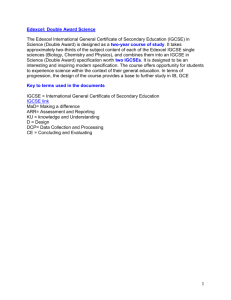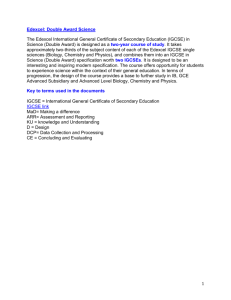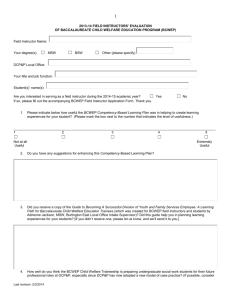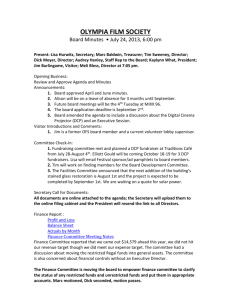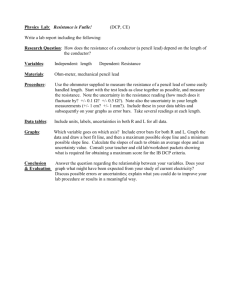Document 11584483
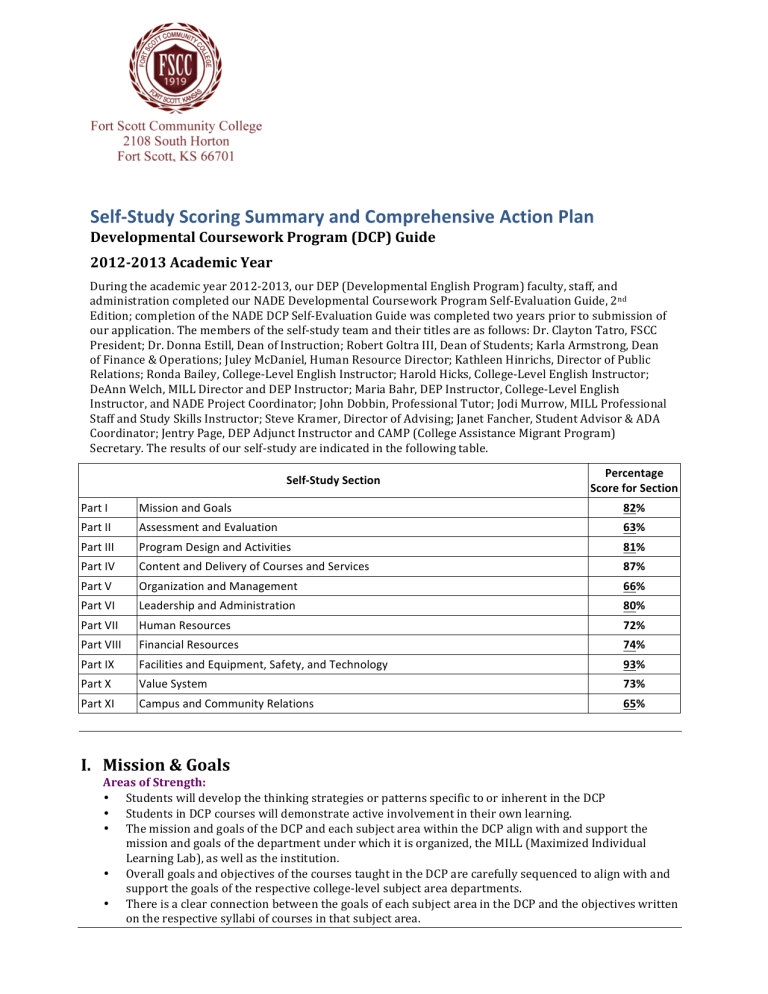
Self-‐Study Scoring Summary and Comprehensive Action Plan
Developmental Coursework Program (DCP) Guide
2012-‐2013 Academic Year
During the academic year 2012-‐2013, our DEP (Developmental English Program) faculty, staff, and administration completed our NADE Developmental Coursework Program Self-‐Evaluation Guide, 2 nd
Edition; completion of the NADE DCP Self-‐Evaluation Guide was completed two years prior to submission of our application. The members of the self-‐study team and their titles are as follows: Dr. Clayton Tatro, FSCC
President; Dr. Donna Estill, Dean of Instruction; Robert Goltra III, Dean of Students; Karla Armstrong, Dean of Finance & Operations; Juley McDaniel, Human Resource Director; Kathleen Hinrichs, Director of Public
Relations; Ronda Bailey, College-‐Level English Instructor; Harold Hicks, College-‐Level English Instructor;
DeAnn Welch, MILL Director and DEP Instructor; Maria Bahr, DEP Instructor, College-‐Level English
Instructor, and NADE Project Coordinator; John Dobbin, Professional Tutor; Jodi Murrow, MILL Professional
Staff and Study Skills Instructor; Steve Kramer, Director of Advising; Janet Fancher, Student Advisor & ADA
Coordinator; Jentry Page, DEP Adjunct Instructor and CAMP (College Assistance Migrant Program)
Secretary. The results of our self-‐study are indicated in the following table.
Self-‐Study Section
Part I Mission and Goals
Part II Assessment and Evaluation
Part III Program Design and Activities
Part IV Content and Delivery of Courses and Services
Part V Organization and Management
Part VI Leadership and Administration
Part VII Human Resources
Part VIII Financial Resources
Part IX Facilities and Equipment, Safety, and Technology
Percentage
Score for Section
82%
63%
81%
87%
66%
80%
72%
74%
93%
Part X Value System
Part XI Campus and Community Relations
73%
65%
I. Mission & Goals
Areas of Strength:
• Students will develop the thinking strategies or patterns specific to or inherent in the DCP
•
Students in DCP courses will demonstrate active involvement in their own learning.
•
The mission and goals of the DCP and each subject area within the DCP align with and support the mission and goals of the department under which it is organized, the MILL (Maximized Individual
Learning Lab), as well as the institution.
•
Overall goals and objectives of the courses taught in the DCP are carefully sequenced to align with and support the goals of the respective college-‐level subject area departments.
•
There is a clear connection between the goals of each subject area in the DCP and the objectives written on the respective syllabi of courses in that subject area.
•
The syllabus of each course in each DCP includes well-‐developed, clearly articulated objectives that are content-‐specific and which outline expectations for student learning.
Areas Needing Improvement:
•
Students will indicate satisfaction with the learning experiences and the learning environments created in their DCP course(s).
•
The mission and goals of the DCP include creating an environment that supports all members of the
DCP community including faculty, instructional staff, support personnel, and students.
•
The DCP subject area course goals and objectives have been intentionally developed to address the assessed needs of the multiple populations served by the college.
•
DCP subject area course goals and objectives are reviewed regularly (approximately every 2 years) and revised as needed by faculty and instructional staff in order to meet institutional, departmental and instructional goals, as well as the assessed needs of students. Input from students is included in such review and revision.
•
The syllabus of each course in the DCP area includes well-‐developed, clearly articulated objectives that address student growth and development in one or more non-‐cognitive domains such as leadership, social responsibility, appreciating diversity, or collaboration.
II. Assessment & Evaluation
Areas of Strength:
•
DCP students’ content knowledge, skill acquisition and/or gains in general competencies are assessed and evaluated frequently within their DCP courses.
•
DCP students’ learning is evaluated by feedback gathered through formative assessment methods such as Classroom Assessment Techniques, and such formative assessment is used to adjust the immediate teaching/learning activities.
•
The DCP includes quantitative and qualitative measures of student learning as a part of its evaluation plan. Such measures might include pre-‐post test scores, teacher analysis of portfolios, and in-‐class activities that demonstrate and measure students’ actual learning.
• Students’ use of active learning strategies is monitored and assessed in their DCP course(s).
•
Students’ competence in the use of technology is evaluated in their DCP courses.
Areas Needing Improvement:
•
The DCP analyzes student outcomes data to determine patterns and trends and uses the results to improve the courses, labs, and services it provides in order to impact student success.
•
DCP students’ academic progress is monitored throughout their enrollment in the DCP and beyond.
•
The DCP monitors and assesses students’ satisfaction with their learning experiences in DCP courses.
•
Student needs are regularly assessed and changes in those needs are reflected in the developmental course goals and objectives.
•
The DCP conducts regular, systematic assessment to evaluate program outcomes.
•
The DCP conducts regular, systematic reviews of its mission, goals, and objectives to assure continued support of the college curriculum and the institution’s academic standards.
•
The institution monitors at least two of the following types of data and reports to the DCP as appropriate:
•
Information on former DCP students’ certificate or degree completion, licensure/certification pass rates, student goal attainment rates, transfer rates, and/or graduation rates, and it provides this information to the DCP.
•
Former DCP students after their transfer to a baccalaureate institution, graduate school, or the work force, and it provides this information to the DCP.
•
For community outreach programs, data on students’ development of basic literacy skills or workforce related skills.
•
Credits earned versus credits attempted, through the second year or 24 credits.
III. Program Design & Activities
Areas of Strength:
• The DCP works with academic departments to assure that the content, scope, and learning outcomes of the DCP curriculum are aligned with subsequent courses in the college curriculum.
• The DCP operates its curriculum in accordance with institutional academic standards and policies.
•
The DCP is a clearly identified and prioritized unit within the academic structure of the overall institution.
•
The DCP is a centralized or highly coordinated entity.
• The DCP and its courses are listed in the institution’s course catalog.
•
The DCP curriculum provides support for the total college curriculum by teaching learning and content strategies that can be transferred to other coursework (in addition to aligning with the subsequent disciplinary course(s)).
Areas Needing Improvement:
•
The institution continuously monitors student needs, preparation levels, enrollment/demographic patterns, and student outcomes, and it shares that information with the DCP.
•
DCP program and curriculum design modifications are based on institution reports of students’ demographics, preparation levels, and enrollment patterns, as well as ongoing analyses of DCP outcomes and student learning outcomes.
•
Individual developmental class, sizes do not exceed 15 students in single-‐instructor developmental writing (NCTE 1 1987; 1989; 1999; 2003) or reading classes, and 20 in single-‐instructor developmental mathematics classes.
IV. Content & Delivery of Courses & Services
Areas of Strength:
•
There is a mandatory, institution-‐wide assessment and placement process through which all students needing services are placed in DCP courses and services.
•
The DCP works with advisors to establish, implement, and enforce policies and practices for placement into DCP courses and services.
•
Each DCP course provides a syllabus which outlines the overall goals of the course, provides an accurate and current course description, lists course objectives, and describes learning expectations, grading/evaluation criteria, and exit standards.
•
Learning objectives for each DCP course are appropriate for the course level and are intentionally and sequentially related to the course(s) immediately preceding and following.
•
Learning objectives of the uppermost DCP course(s) are intentionally and sequentially related to the expectations of the subsequent, college-‐level related course(s).
•
Instructional materials and activities introduce students to educational technology that prepares them for subsequent courses and the general college curriculum.
Areas Needing Improvement:
• Assessment and placement policies and procedures for developmental courses are clearly communicated to students before testing takes place.
• Changes to assessment and placement policies and procedures are based on ongoing evaluations of incoming student demographics and developmental as well as non-‐developmental student outcomes.
V. Organization & Management
Areas of Strength:
•
The DCP is purposefully organized and managed to promote student development, student success, and student learning.
•
The DCP and its courses/instructional activities are well-‐defined components of the institution’s academic program.
•
The DCP organizational chart shows positions and reporting relationships within and beyond the DCP.
• Detailed position descriptions exist for all DCP personnel.
Areas Needing Improvement:
• The DCP has a written set of administrative policies, procedures, and performance expectations which parallel institutional policies, procedures, and performance expectations.
• The DCP has systematic communication in place to share essential program information, coordinate delivery of courses and/or programs, address challenges, review assessment data and generate evaluations, make decisions and action plans, and envision the future via long-‐ and short-‐range planning.
1
NCTE: National Council of Teachers of English
VI. Leadership & Administration
Areas of Strength:
• The DCP is administered by a full-‐time professional or faculty member. This person will have appropriate academic credentials, specific experience in developmental education and/or learning assistance, and leadership ability. Academic credentials will parallel those of directors, deans, chairs, vice presidents, and/or faculty with similar departmental responsibilities at the institution.
•
The Director of the DCP has input into institutional decisions that affect student assessment and placement, retention, and student success measures.
•
In conjunction with DCP faculty and instructional staff, the Director develops and articulates the vision, mission, and goals for the programs and services of the DCP.
•
DCP faculty and support personnel serve on and/or chair key committees in the institution.
•
Instructors have sufficient current knowledge and background in their fields, including use of required technology.
•
Instructors use appropriate technology to assist students to improve learning strategies.
• Instructors foster collaborative learning when appropriate, helping students learn from each other
(e.g., through learning communities; study groups; small-‐group, interactive, in-‐class discussions; paired learning; peer evaluation).
Areas Needing Improvement:
•
The Director of the DCP has responsibility for all faculty and support personnel of the DCP.
•
A written set of procedures for creating and revising developmental courses exists.
• Full-‐time faculty and instructional staff collaborate to create and maintain common syllabi for developmental courses at each discipline level, relate the developmental curricula to subsequent course curricula and to the curricular needs of other academic departments, and plan and manage other DCP curricular issues.
VII. Human Resources
Areas of Strength:
• All DCP administrators and support personnel are qualified to perform their assigned duties by virtue of educational credentials and/or an appropriate combination of education, training, and experience relevant to developmental education and learning assistance.
•
All faculty and DCP personnel who hold joint appointments in the DCP and in another department or division are committed to the philosophy, objectives, and priorities of the DCP and are qualified to teach in their assigned discipline.
•
The DCP follows institutional policies and procedures for hiring personnel and determining salary and compensation packages.
•
The DCP uses fair, inclusive, and non-‐discriminatory practices in hiring and promoting employees.
•
All personnel—faculty, support personnel, administrators— of the DCP are treated equitably with other institutional personnel in terms of performance reviews, regular and meritorious salary increases, and promotion, rank, and tenure processes.
•
As much as possible, in-‐house professional development is provided in both face-‐to-‐face and electronic venues so that participation is available for part-‐time instructional faculty and for faculty hired after the date of the activity.
Areas Needing Improvement:
• Tutors who work with developmental students have appropriate qualifications and engage in training activities.
• Faculty and instructional staff remain current in both content-‐relevant and pedagogical theories and practices in their discipline, as well as in developmental education.
• The DCP uses regularized, written, and systematic institutional policies and procedures to evaluate DCP personnel, including the Director, faculty and instructional staff, support personnel, graduate assistants, tutors, and student workers.
•
DCP faculty and instructional staff are evaluated each semester by their students.
• Faculty and instructional staff meet regularly to share teaching ideas, curriculum issues, and innovations. Agendas and minutes are distributed and/or are posted electronically.
• Faculty and instructional staff stay current in theories and practices of developmental education, student learning theory, adult learning theory, best practices in assessment, Universal Design, technology, and professional standards of practice in their area(s) of specialization.
•
The DCP maintains subscriptions or has access to journals in the field of developmental education and learning assistance as well as journals in the various disciplines connected to the DCP.
VIII. Financial Resources
Areas of Strength:
•
Funds are allocated between administrative costs and direct instructional services in a manner commensurate with other institutional departments and programs.
•
Regular funding provides for new and upgraded texts, materials, computers, audio visual, and technological software and hardware to supplement and enhance classroom and laboratory activities.
•
Funding for compensation for all DCP personnel (faculty, part-‐time and adjunct faculty, instructional staff, administrators, professionals, paraprofessionals, and all others) is sufficient and commensurate with compensation for comparable institutional positions.
•
Additional funding or institutional resources are available for DCP personnel to create and maintain innovative teaching methods especially suited to developmental students, given the at-‐risk nature of these students.
Areas Needing Improvement:
•
As a part of its budget and accounting procedures, the DCP includes measures to demonstrate cost effectiveness associated with student retention and student success.
•
The DCP has a direct budget line for memberships in appropriate professional organizations, subscriptions to professional publications, on-‐campus speakers, and/or books for a professional library.
• The DCP budget provides for release time for faculty, instructional staff, and personnel to devote time and energy to pursuing grants, to participate in sabbaticals, and to conduct research.
IX. Facilities & Equipment, Safety & Technology
Areas of Strength:
• The DCP is provided access to and support for technological advances that support instruction such as
Blackboard, WebCT, podcasting, and others.
• Technology (i.e., computers, software, and assistive and/or adaptive hardware and software) is readily available to DCP students.
• Technological equipment (hardware and software) provided in classrooms, labs, and teaching spaces for DCP students is at least commensurate with equipment provided in non-‐DCP instructional areas.
• Facilities are located centrally, in areas convenient to campus academic activity.
•
Offices and work areas for all DCP personnel have technological hardware and software comparable to that provided for other institutional personnel.
•
Computers and technological hardware are updated regularly (at least every two to three years).
Areas Needing Improvement:
•
Classrooms, labs, tutoring areas, offices, and other work spaces are well-‐lighted, well-‐ventilated, and adequately heated and cooled.
X. Value System
Areas of Strength:
•
All DCP personnel have access to legal advice as needed to implement assigned responsibilities.
•
The DCP incorporates Universal Design principles in its own operations, and promotes them elsewhere.
• The DCP recognizes the value of each student and his or her individual learning needs.
•
DCP personnel promote a campus environment that recognizes, accepts, and honors the commonalities and differences among people.
•
The DCP provides educational experiences that allow students to appreciate their own and others’ identities, cultures, and heritages.
Areas Needing Improvement:
• To provide a multicultural learning environment, the DCP intentionally diversifies its faculty and personnel to be representative of the cultures and characteristics of the DCP student population.
• DCP personnel are knowledgeable about and refer students to appropriate campus and community resources for academic and personal needs beyond the scope of the DCP and/or the expertise of its faculty, instructional staff, and support staff.
•
The institution provides professional liability coverage for all DCP personnel.
•
DCP personnel are familiar with and apply ethical standards and guidelines stated or implied by their respective disciplines. Standards may include but are not limited to NADE resolutions and position statements; guidelines and position statements from NCTE (National Council of Teachers of English),
IRA (International Reading Association), MAA (Mathematical Association of America), and AMATYC
(American Mathematical Association of Two-‐Year Colleges); the Statement of Ethical Principles and
Standards from the American College Personnel Association (ACPA); and the Statement of Shared
Ethical Principles for Student Services in Higher Education from the Council for the Advancement of
Standards in Higher Education (CAS).
XI. Campus & Community Relationships
Areas of Strength:
•
The DCP establishes, maintains, and promotes effective working relationships with campus individuals, programs, and agencies whose operations are relevant to the DCP’s stated mission.
•
The DCP promotes projects and collaborates with departments or entities to establish and maintain initiatives that hold promise for strengthening developmental student success.
•
The DCP has direct representation on institutional committees relevant to the mission and goals of the program.
•
Academic advisors are fully informed and regularly updated about developmental courses, their sequences, and criteria for placing students in DCP courses.
•
Curricular collaboration and constructive relationships with other academic units allow DCP students to move seamlessly to and from other programs.
Areas Needing Improvement:
• The DCP is represented in relevant community and external agencies and
•
The DCP and the institution collaborate with local community organizations and businesses to establish partnerships, assess for needed educational services, and provide such services as appropriate.
•
Clear statements regarding required and recommended developmental courses and instructional options are included in the catalog, on web-‐based or online documents, and in other institutional publications.
• To enhance the DCP curriculum, DCP faculty, instructional staff, or other personnel form connections with upper level programs, graduate students, or graduate programs, either within the college or at nearby universities, to serve as learning resource specialists. The DCP also uses these connections to strengthen and inform the DCP program and curriculum.
•
The DCP and the institution establish, maintain, and promote effective relations with relevant city, county, state, regional, federal, and other external agencies.
•
The DCP is represented in relevant community and external agencies and uses those connections to build bridges between the institution and the agencies.
•
The DCP and the institution collaborate with local community organizations and businesses to establish partnerships, assess for needed educational services, and provide such services as appropriate.
•
To enhance the DCP curriculum, DCP faculty, instructional staff, or other personnel form connections with upper level programs, graduate students, or graduate programs, either within the college or at nearby universities, to serve as learning resource specialists. The DCP also uses these connections to strengthen and inform the DCP program and curriculum.

